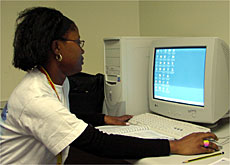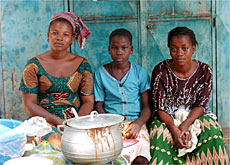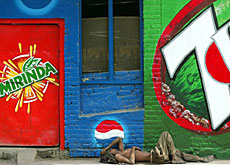ICTs point to way out of unemployment trap

Conventional wisdom says entrepreneurs are born, not made.
But a group of underprivileged South African youths is hoping to prove the opposite, with the support of a Swiss-backed technology training scheme.
Just over half of all South Africans aged between 15 and 30 are unemployed, according to the Swiss-South African Cooperation Initiative (SSACI).
And of those job seekers, it’s estimated that 61 per cent are black, while just ten per cent are white.
Apartheid legacy
The head of the SSACI, Ken Duncan, attributes this disparity to the country’s legacy of apartheid, which has left millions of black people unskilled and untrained.
“Apartheid had a profound effect on the pattern of youth employment,” Duncan told swissinfo.
“Under-funding of public schooling for blacks meant that they generally have lower qualifications than their white counterparts, especially in subjects like maths, science and technology,” he added.
Duncan also cites the high concentration of young blacks living in poverty-stricken urban and rural ghettoes – where jobs are few and far between – as a reason why they are at a disadvantage when it comes to finding work.
Skills training
But the SSACI believes that training in information and communication technologies (ICTs) could help reduce the barriers to entry into urban job markets.
“The ICT sector is one of the growth industries here in South Africa,” said Duncan.
“And what makes it very attractive for us is that it’s not only growing in terms of its profitability and turnover, but it’s also creating jobs out of that growth that young people can fill.”
The organisation is currently funding a “venture-creation” initiative involving 30 students at the Institute of Technology in Durban, on the country’s east coast.
The aim of the project is to turn underprivileged youths into entrepreneurs by giving them IT and management training, as well as professional guidance in starting up a small business.
“We’re also giving them life skills, which the vast majority of black people in this country have never had, because very little importance was placed on individuals and their goals,” the head of the Durban programme, Shirlee Parsons, told swissinfo.
Funding
Following several months of training at the start of the year, the students are now in the process of getting their companies – which range from web design agencies to hardware supply shops – up and running.
But they say that despite their newly acquired skills, it’s been an uphill battle to find banks and venture capitalists willing to back youngsters who lack prior business experience.
“The bank says you need to show your assets, but when you come from a disadvantaged background, chances are you’re not going to have anything to use as collateral for a start-up loan,” said Zaheera Patel, who is working to get a graphics design company off the ground.
“The biggest crisis they face is that they have very little access to funding,” Parsons confirmed. “There’s no one to co-sign on a loan for them and the banks are not willing to bend the rules.”
Aids and HIV
A lack of funding isn’t the only thing these youths are up against, however.
South Africa’s soaring number of HIV infections – one of the highest in the world at more than 12 per cent of the population – is expected to take a heavy toll on the country’s economically-active population over the next decade.
According to the United Nations, 60 per cent of South African boys aged 15 today will become infected with HIV during their lifetime.
And Parsons says the devastating effects of the virus are already being felt among her students.
“At least eight of our students lost a close family member to Aids or violent crime in the space of one month,” Parsons said.
“It’s a minefield out there for them. And, it’s not simply about their futures and training, it’s about a hell of a lot more than that… because when you’re sick or starving, self-actualisation comes a very bad last,” she added.
swissinfo, Anna Nelson in Durban, South Africa
Forty two per cent of South Africa’s economically active population is aged 15 to 30.
Only six per cent of the nation’s black youths have a higher education, compared with 32 per cent of white youths.
The UN estimates that around 10,000 children live or work on the city streets of South Africa.
Sixty per cent of South African boys aged 15 today will become infected with HIV during their lifetime.
Just over half of all young people in South Africa are unemployed – the majority of whom are black and come from disadvantaged backgrounds.
The Swiss-South African Cooperation Imitative (SSACI) says the legacy of apartheid has left millions of young South Africans untrained and unskilled.
But the organisation, which provides vocational and employment opportunities for underprivileged youths, believes that improved training in information and communication technologies (ICTs) could help many of them find jobs.
The SSACI, which works with the Swiss Agency for Cooperation and Development and Swiss businesses in South Africa, is backing a “venture-creation” initiative aimed at turning unemployed young people into entrepreneurs.

In compliance with the JTI standards
More: SWI swissinfo.ch certified by the Journalism Trust Initiative


You can find an overview of ongoing debates with our journalists here. Please join us!
If you want to start a conversation about a topic raised in this article or want to report factual errors, email us at english@swissinfo.ch.